Strategies for Managing Stressful Situations in Nursing Practice
VerifiedAdded on 2022/09/18
|9
|2374
|24
Essay
AI Summary
This assignment delves into the critical issue of stress within the nursing profession, acknowledging its detrimental impact on nurses' health, well-being, and the quality of patient care. The author reflects on personal experiences and insights gained through coursework, emphasizing the importance of developing effective coping strategies for professional transitions. The assignment highlights various sources of stress, including poor interpersonal relationships, long working hours, and emotional demands, and underscores the need for proactive stress management. The student identifies key strategies, such as open communication, seeking support from colleagues and family, developing emergency coping mechanisms, and organizing daily life to mitigate stress. The assignment concludes by emphasizing the significance of a positive attitude, gratitude, and the adoption of stress-coping strategies to ensure successful navigation of challenging situations in nursing practice. The student aims to improve communication skills, foster open sharing of personal matters, and enhance emergency response capabilities, contributing to improved patient outcomes and personal well-being.
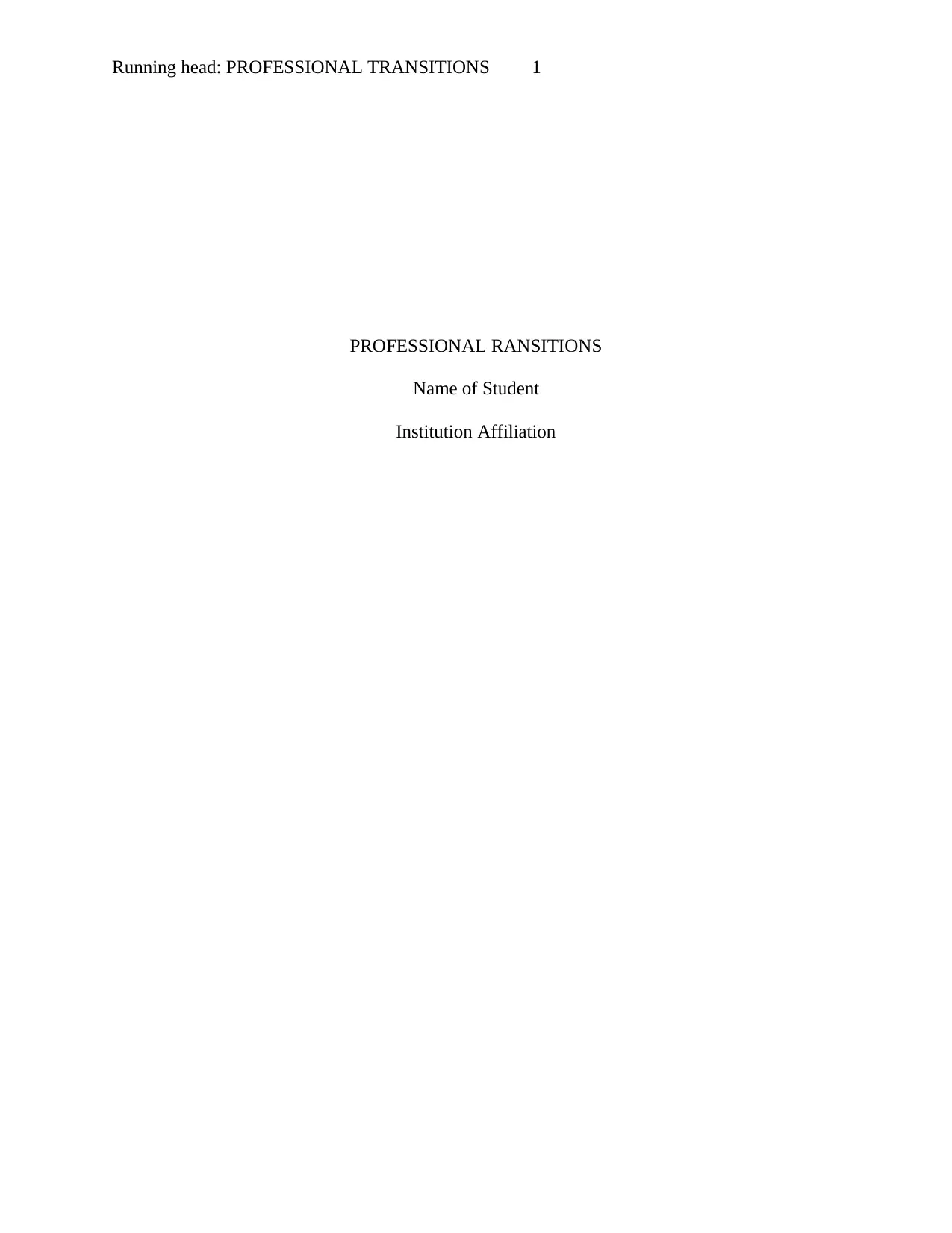
Running head: PROFESSIONAL TRANSITIONS 1
PROFESSIONAL RANSITIONS
Name of Student
Institution Affiliation
PROFESSIONAL RANSITIONS
Name of Student
Institution Affiliation
Paraphrase This Document
Need a fresh take? Get an instant paraphrase of this document with our AI Paraphraser
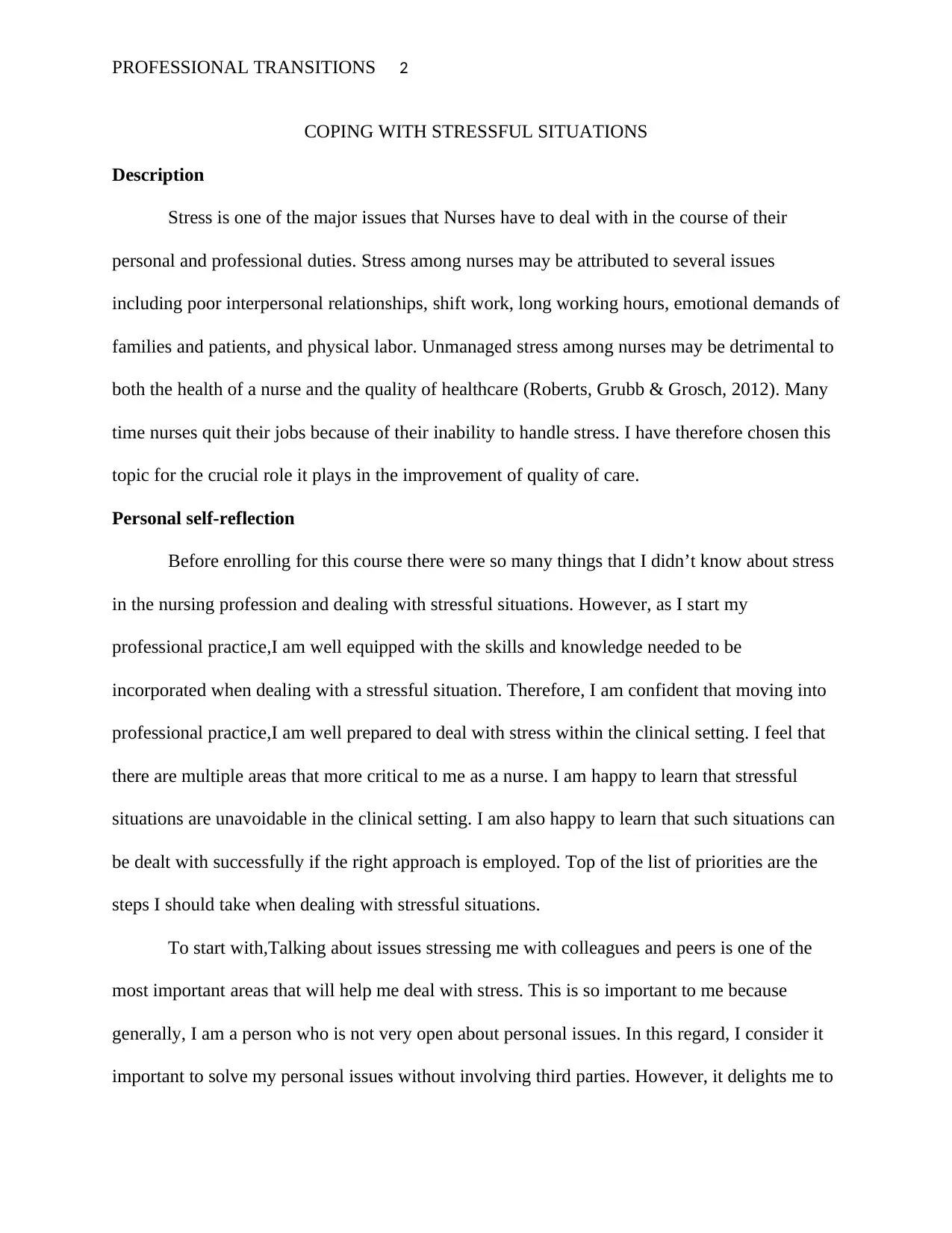
PROFESSIONAL TRANSITIONS 2
COPING WITH STRESSFUL SITUATIONS
Description
Stress is one of the major issues that Nurses have to deal with in the course of their
personal and professional duties. Stress among nurses may be attributed to several issues
including poor interpersonal relationships, shift work, long working hours, emotional demands of
families and patients, and physical labor. Unmanaged stress among nurses may be detrimental to
both the health of a nurse and the quality of healthcare (Roberts, Grubb & Grosch, 2012). Many
time nurses quit their jobs because of their inability to handle stress. I have therefore chosen this
topic for the crucial role it plays in the improvement of quality of care.
Personal self-reflection
Before enrolling for this course there were so many things that I didn’t know about stress
in the nursing profession and dealing with stressful situations. However, as I start my
professional practice,I am well equipped with the skills and knowledge needed to be
incorporated when dealing with a stressful situation. Therefore, I am confident that moving into
professional practice,I am well prepared to deal with stress within the clinical setting. I feel that
there are multiple areas that more critical to me as a nurse. I am happy to learn that stressful
situations are unavoidable in the clinical setting. I am also happy to learn that such situations can
be dealt with successfully if the right approach is employed. Top of the list of priorities are the
steps I should take when dealing with stressful situations.
To start with,Talking about issues stressing me with colleagues and peers is one of the
most important areas that will help me deal with stress. This is so important to me because
generally, I am a person who is not very open about personal issues. In this regard, I consider it
important to solve my personal issues without involving third parties. However, it delights me to
COPING WITH STRESSFUL SITUATIONS
Description
Stress is one of the major issues that Nurses have to deal with in the course of their
personal and professional duties. Stress among nurses may be attributed to several issues
including poor interpersonal relationships, shift work, long working hours, emotional demands of
families and patients, and physical labor. Unmanaged stress among nurses may be detrimental to
both the health of a nurse and the quality of healthcare (Roberts, Grubb & Grosch, 2012). Many
time nurses quit their jobs because of their inability to handle stress. I have therefore chosen this
topic for the crucial role it plays in the improvement of quality of care.
Personal self-reflection
Before enrolling for this course there were so many things that I didn’t know about stress
in the nursing profession and dealing with stressful situations. However, as I start my
professional practice,I am well equipped with the skills and knowledge needed to be
incorporated when dealing with a stressful situation. Therefore, I am confident that moving into
professional practice,I am well prepared to deal with stress within the clinical setting. I feel that
there are multiple areas that more critical to me as a nurse. I am happy to learn that stressful
situations are unavoidable in the clinical setting. I am also happy to learn that such situations can
be dealt with successfully if the right approach is employed. Top of the list of priorities are the
steps I should take when dealing with stressful situations.
To start with,Talking about issues stressing me with colleagues and peers is one of the
most important areas that will help me deal with stress. This is so important to me because
generally, I am a person who is not very open about personal issues. In this regard, I consider it
important to solve my personal issues without involving third parties. However, it delights me to
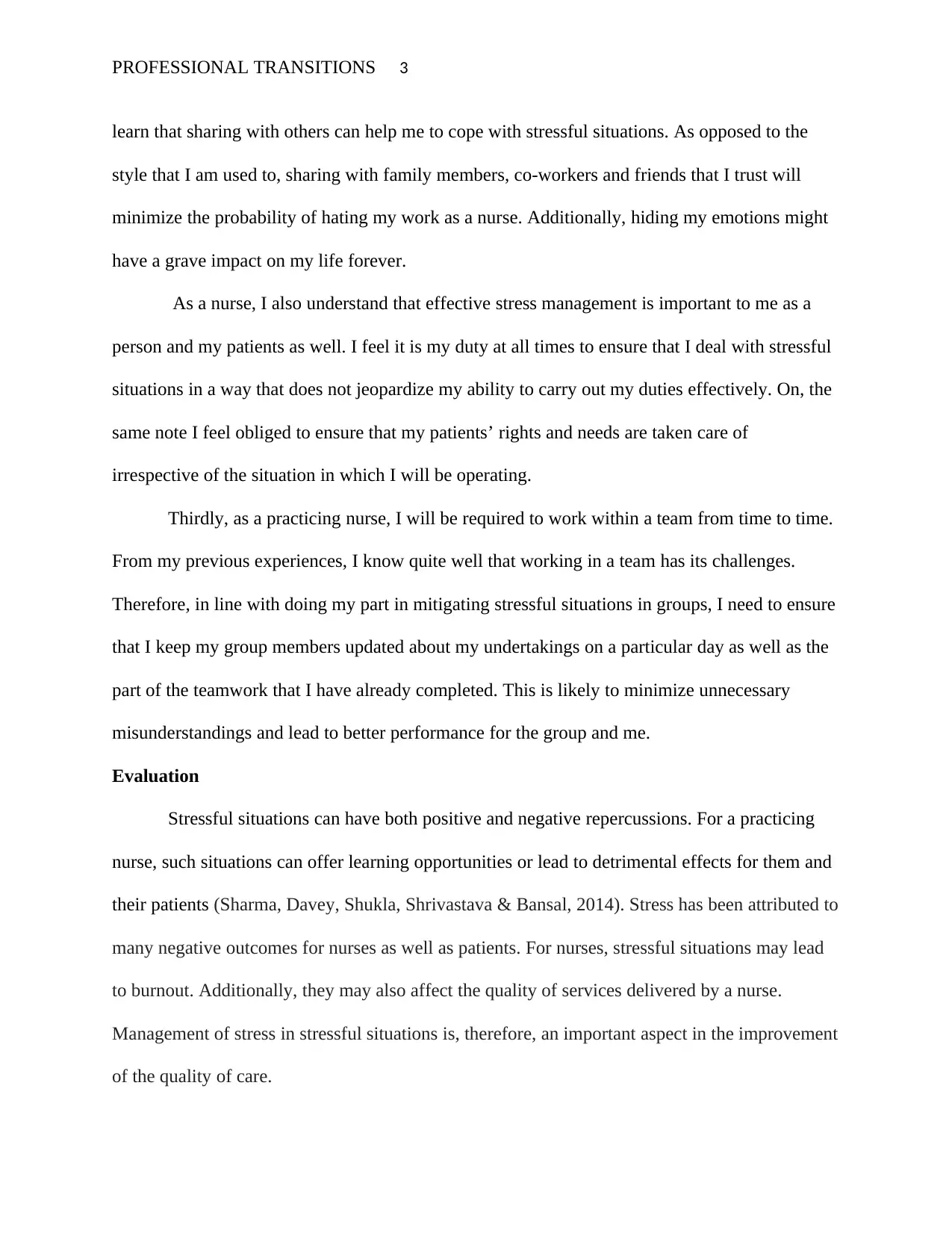
PROFESSIONAL TRANSITIONS 3
learn that sharing with others can help me to cope with stressful situations. As opposed to the
style that I am used to, sharing with family members, co-workers and friends that I trust will
minimize the probability of hating my work as a nurse. Additionally, hiding my emotions might
have a grave impact on my life forever.
As a nurse, I also understand that effective stress management is important to me as a
person and my patients as well. I feel it is my duty at all times to ensure that I deal with stressful
situations in a way that does not jeopardize my ability to carry out my duties effectively. On, the
same note I feel obliged to ensure that my patients’ rights and needs are taken care of
irrespective of the situation in which I will be operating.
Thirdly, as a practicing nurse, I will be required to work within a team from time to time.
From my previous experiences, I know quite well that working in a team has its challenges.
Therefore, in line with doing my part in mitigating stressful situations in groups, I need to ensure
that I keep my group members updated about my undertakings on a particular day as well as the
part of the teamwork that I have already completed. This is likely to minimize unnecessary
misunderstandings and lead to better performance for the group and me.
Evaluation
Stressful situations can have both positive and negative repercussions. For a practicing
nurse, such situations can offer learning opportunities or lead to detrimental effects for them and
their patients (Sharma, Davey, Shukla, Shrivastava & Bansal, 2014). Stress has been attributed to
many negative outcomes for nurses as well as patients. For nurses, stressful situations may lead
to burnout. Additionally, they may also affect the quality of services delivered by a nurse.
Management of stress in stressful situations is, therefore, an important aspect in the improvement
of the quality of care.
learn that sharing with others can help me to cope with stressful situations. As opposed to the
style that I am used to, sharing with family members, co-workers and friends that I trust will
minimize the probability of hating my work as a nurse. Additionally, hiding my emotions might
have a grave impact on my life forever.
As a nurse, I also understand that effective stress management is important to me as a
person and my patients as well. I feel it is my duty at all times to ensure that I deal with stressful
situations in a way that does not jeopardize my ability to carry out my duties effectively. On, the
same note I feel obliged to ensure that my patients’ rights and needs are taken care of
irrespective of the situation in which I will be operating.
Thirdly, as a practicing nurse, I will be required to work within a team from time to time.
From my previous experiences, I know quite well that working in a team has its challenges.
Therefore, in line with doing my part in mitigating stressful situations in groups, I need to ensure
that I keep my group members updated about my undertakings on a particular day as well as the
part of the teamwork that I have already completed. This is likely to minimize unnecessary
misunderstandings and lead to better performance for the group and me.
Evaluation
Stressful situations can have both positive and negative repercussions. For a practicing
nurse, such situations can offer learning opportunities or lead to detrimental effects for them and
their patients (Sharma, Davey, Shukla, Shrivastava & Bansal, 2014). Stress has been attributed to
many negative outcomes for nurses as well as patients. For nurses, stressful situations may lead
to burnout. Additionally, they may also affect the quality of services delivered by a nurse.
Management of stress in stressful situations is, therefore, an important aspect in the improvement
of the quality of care.
⊘ This is a preview!⊘
Do you want full access?
Subscribe today to unlock all pages.

Trusted by 1+ million students worldwide
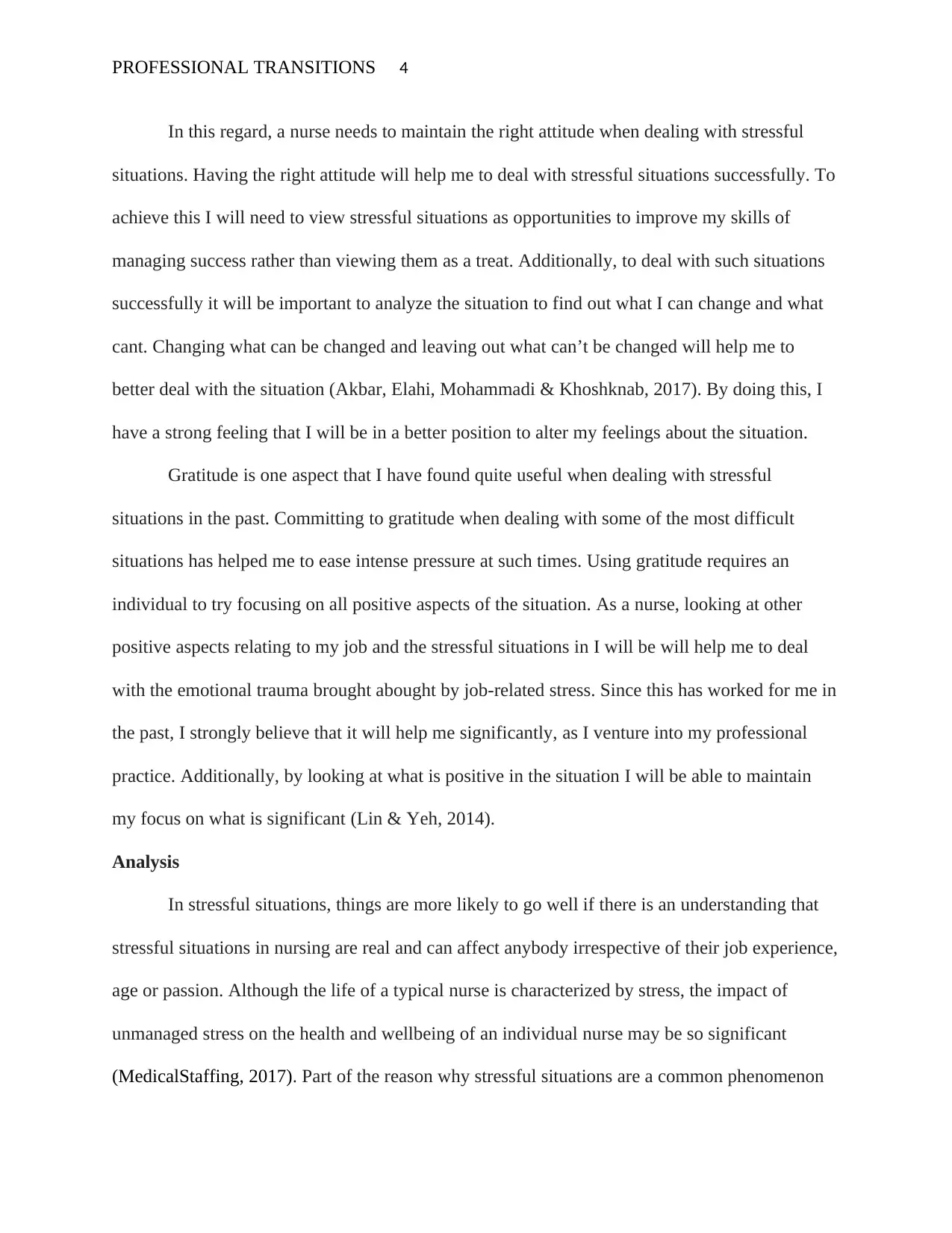
PROFESSIONAL TRANSITIONS 4
In this regard, a nurse needs to maintain the right attitude when dealing with stressful
situations. Having the right attitude will help me to deal with stressful situations successfully. To
achieve this I will need to view stressful situations as opportunities to improve my skills of
managing success rather than viewing them as a treat. Additionally, to deal with such situations
successfully it will be important to analyze the situation to find out what I can change and what
cant. Changing what can be changed and leaving out what can’t be changed will help me to
better deal with the situation (Akbar, Elahi, Mohammadi & Khoshknab, 2017). By doing this, I
have a strong feeling that I will be in a better position to alter my feelings about the situation.
Gratitude is one aspect that I have found quite useful when dealing with stressful
situations in the past. Committing to gratitude when dealing with some of the most difficult
situations has helped me to ease intense pressure at such times. Using gratitude requires an
individual to try focusing on all positive aspects of the situation. As a nurse, looking at other
positive aspects relating to my job and the stressful situations in I will be will help me to deal
with the emotional trauma brought abought by job-related stress. Since this has worked for me in
the past, I strongly believe that it will help me significantly, as I venture into my professional
practice. Additionally, by looking at what is positive in the situation I will be able to maintain
my focus on what is significant (Lin & Yeh, 2014).
Analysis
In stressful situations, things are more likely to go well if there is an understanding that
stressful situations in nursing are real and can affect anybody irrespective of their job experience,
age or passion. Although the life of a typical nurse is characterized by stress, the impact of
unmanaged stress on the health and wellbeing of an individual nurse may be so significant
(MedicalStaffing, 2017). Part of the reason why stressful situations are a common phenomenon
In this regard, a nurse needs to maintain the right attitude when dealing with stressful
situations. Having the right attitude will help me to deal with stressful situations successfully. To
achieve this I will need to view stressful situations as opportunities to improve my skills of
managing success rather than viewing them as a treat. Additionally, to deal with such situations
successfully it will be important to analyze the situation to find out what I can change and what
cant. Changing what can be changed and leaving out what can’t be changed will help me to
better deal with the situation (Akbar, Elahi, Mohammadi & Khoshknab, 2017). By doing this, I
have a strong feeling that I will be in a better position to alter my feelings about the situation.
Gratitude is one aspect that I have found quite useful when dealing with stressful
situations in the past. Committing to gratitude when dealing with some of the most difficult
situations has helped me to ease intense pressure at such times. Using gratitude requires an
individual to try focusing on all positive aspects of the situation. As a nurse, looking at other
positive aspects relating to my job and the stressful situations in I will be will help me to deal
with the emotional trauma brought abought by job-related stress. Since this has worked for me in
the past, I strongly believe that it will help me significantly, as I venture into my professional
practice. Additionally, by looking at what is positive in the situation I will be able to maintain
my focus on what is significant (Lin & Yeh, 2014).
Analysis
In stressful situations, things are more likely to go well if there is an understanding that
stressful situations in nursing are real and can affect anybody irrespective of their job experience,
age or passion. Although the life of a typical nurse is characterized by stress, the impact of
unmanaged stress on the health and wellbeing of an individual nurse may be so significant
(MedicalStaffing, 2017). Part of the reason why stressful situations are a common phenomenon
Paraphrase This Document
Need a fresh take? Get an instant paraphrase of this document with our AI Paraphraser
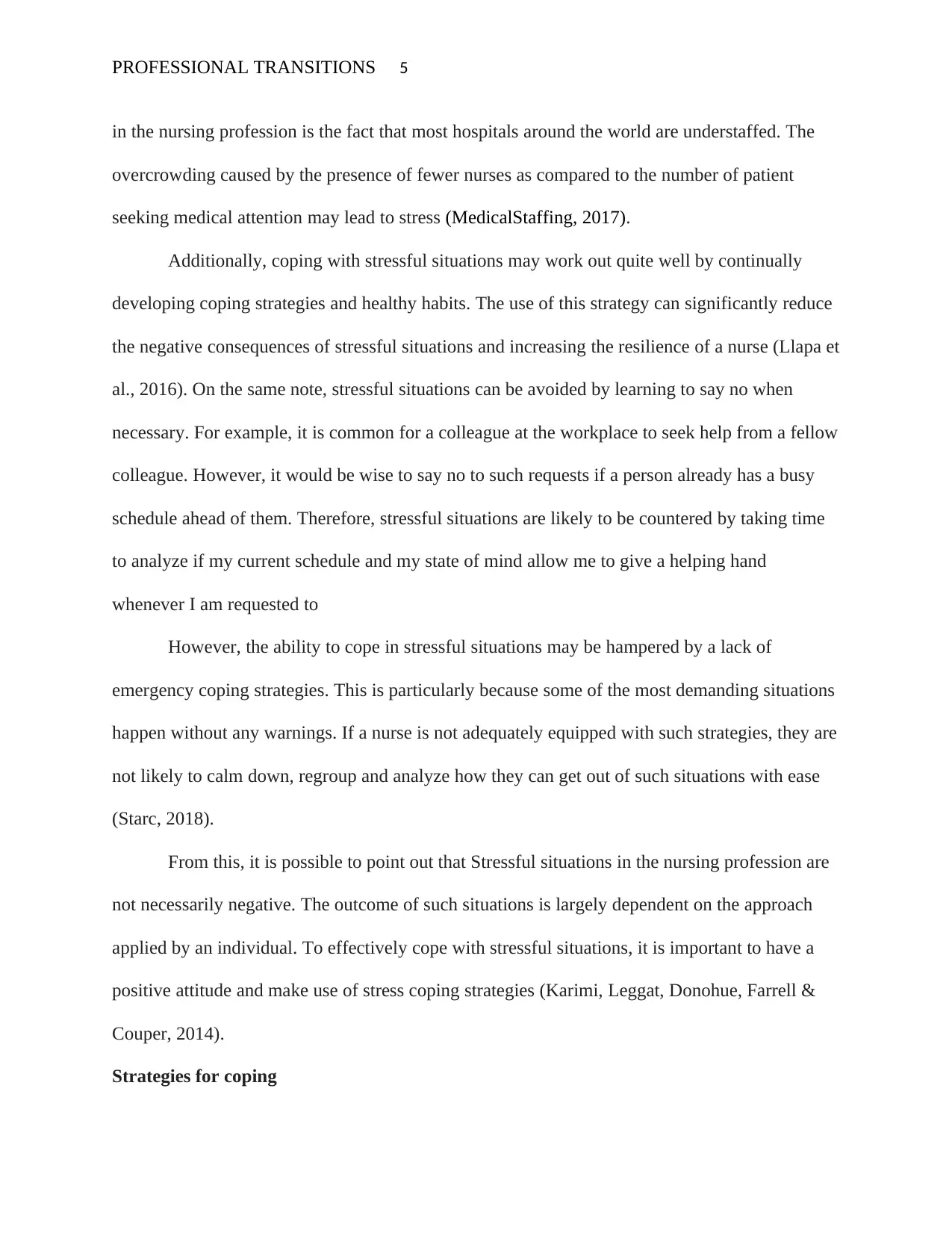
PROFESSIONAL TRANSITIONS 5
in the nursing profession is the fact that most hospitals around the world are understaffed. The
overcrowding caused by the presence of fewer nurses as compared to the number of patient
seeking medical attention may lead to stress (MedicalStaffing, 2017).
Additionally, coping with stressful situations may work out quite well by continually
developing coping strategies and healthy habits. The use of this strategy can significantly reduce
the negative consequences of stressful situations and increasing the resilience of a nurse (Llapa et
al., 2016). On the same note, stressful situations can be avoided by learning to say no when
necessary. For example, it is common for a colleague at the workplace to seek help from a fellow
colleague. However, it would be wise to say no to such requests if a person already has a busy
schedule ahead of them. Therefore, stressful situations are likely to be countered by taking time
to analyze if my current schedule and my state of mind allow me to give a helping hand
whenever I am requested to
However, the ability to cope in stressful situations may be hampered by a lack of
emergency coping strategies. This is particularly because some of the most demanding situations
happen without any warnings. If a nurse is not adequately equipped with such strategies, they are
not likely to calm down, regroup and analyze how they can get out of such situations with ease
(Starc, 2018).
From this, it is possible to point out that Stressful situations in the nursing profession are
not necessarily negative. The outcome of such situations is largely dependent on the approach
applied by an individual. To effectively cope with stressful situations, it is important to have a
positive attitude and make use of stress coping strategies (Karimi, Leggat, Donohue, Farrell &
Couper, 2014).
Strategies for coping
in the nursing profession is the fact that most hospitals around the world are understaffed. The
overcrowding caused by the presence of fewer nurses as compared to the number of patient
seeking medical attention may lead to stress (MedicalStaffing, 2017).
Additionally, coping with stressful situations may work out quite well by continually
developing coping strategies and healthy habits. The use of this strategy can significantly reduce
the negative consequences of stressful situations and increasing the resilience of a nurse (Llapa et
al., 2016). On the same note, stressful situations can be avoided by learning to say no when
necessary. For example, it is common for a colleague at the workplace to seek help from a fellow
colleague. However, it would be wise to say no to such requests if a person already has a busy
schedule ahead of them. Therefore, stressful situations are likely to be countered by taking time
to analyze if my current schedule and my state of mind allow me to give a helping hand
whenever I am requested to
However, the ability to cope in stressful situations may be hampered by a lack of
emergency coping strategies. This is particularly because some of the most demanding situations
happen without any warnings. If a nurse is not adequately equipped with such strategies, they are
not likely to calm down, regroup and analyze how they can get out of such situations with ease
(Starc, 2018).
From this, it is possible to point out that Stressful situations in the nursing profession are
not necessarily negative. The outcome of such situations is largely dependent on the approach
applied by an individual. To effectively cope with stressful situations, it is important to have a
positive attitude and make use of stress coping strategies (Karimi, Leggat, Donohue, Farrell &
Couper, 2014).
Strategies for coping
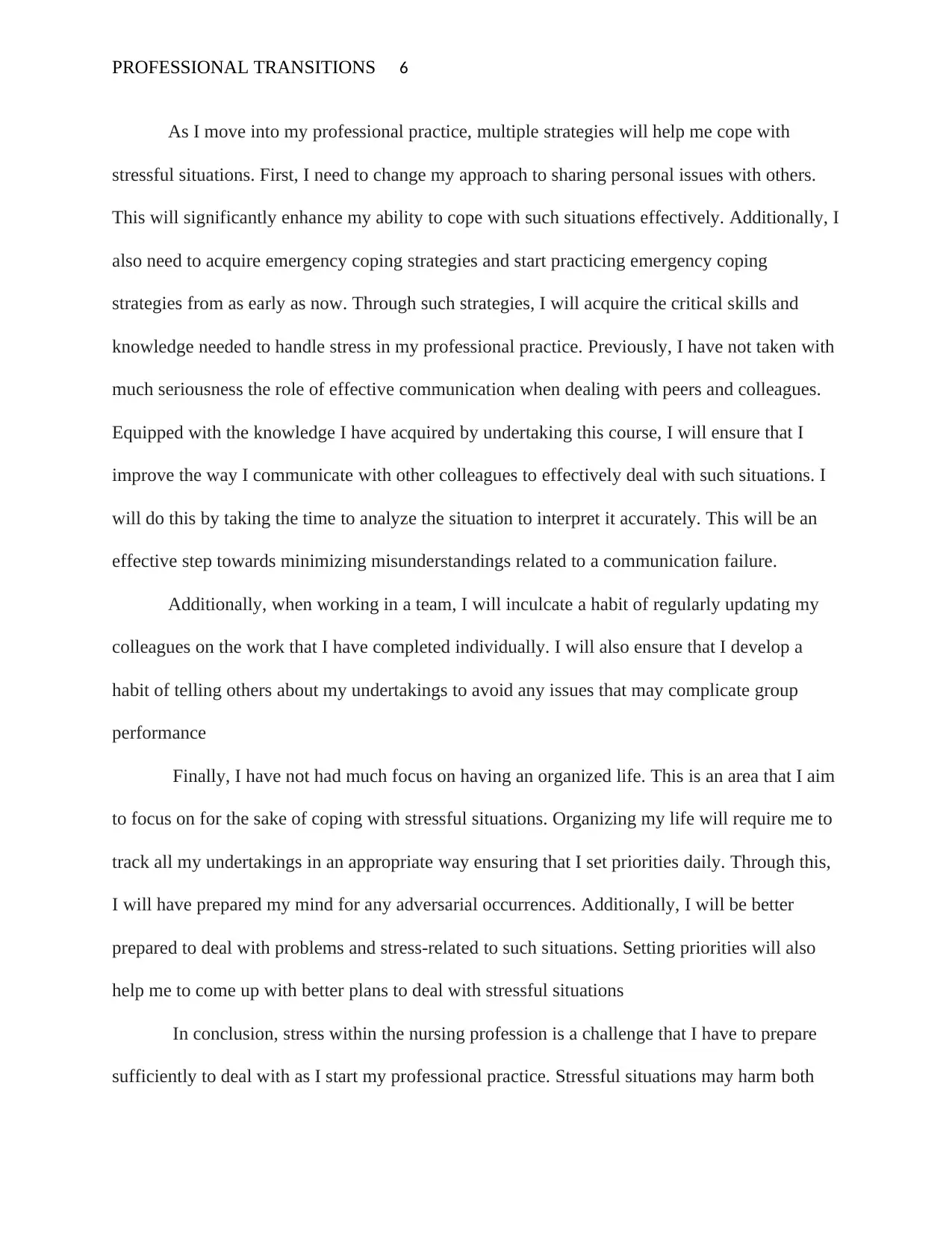
PROFESSIONAL TRANSITIONS 6
As I move into my professional practice, multiple strategies will help me cope with
stressful situations. First, I need to change my approach to sharing personal issues with others.
This will significantly enhance my ability to cope with such situations effectively. Additionally, I
also need to acquire emergency coping strategies and start practicing emergency coping
strategies from as early as now. Through such strategies, I will acquire the critical skills and
knowledge needed to handle stress in my professional practice. Previously, I have not taken with
much seriousness the role of effective communication when dealing with peers and colleagues.
Equipped with the knowledge I have acquired by undertaking this course, I will ensure that I
improve the way I communicate with other colleagues to effectively deal with such situations. I
will do this by taking the time to analyze the situation to interpret it accurately. This will be an
effective step towards minimizing misunderstandings related to a communication failure.
Additionally, when working in a team, I will inculcate a habit of regularly updating my
colleagues on the work that I have completed individually. I will also ensure that I develop a
habit of telling others about my undertakings to avoid any issues that may complicate group
performance
Finally, I have not had much focus on having an organized life. This is an area that I aim
to focus on for the sake of coping with stressful situations. Organizing my life will require me to
track all my undertakings in an appropriate way ensuring that I set priorities daily. Through this,
I will have prepared my mind for any adversarial occurrences. Additionally, I will be better
prepared to deal with problems and stress-related to such situations. Setting priorities will also
help me to come up with better plans to deal with stressful situations
In conclusion, stress within the nursing profession is a challenge that I have to prepare
sufficiently to deal with as I start my professional practice. Stressful situations may harm both
As I move into my professional practice, multiple strategies will help me cope with
stressful situations. First, I need to change my approach to sharing personal issues with others.
This will significantly enhance my ability to cope with such situations effectively. Additionally, I
also need to acquire emergency coping strategies and start practicing emergency coping
strategies from as early as now. Through such strategies, I will acquire the critical skills and
knowledge needed to handle stress in my professional practice. Previously, I have not taken with
much seriousness the role of effective communication when dealing with peers and colleagues.
Equipped with the knowledge I have acquired by undertaking this course, I will ensure that I
improve the way I communicate with other colleagues to effectively deal with such situations. I
will do this by taking the time to analyze the situation to interpret it accurately. This will be an
effective step towards minimizing misunderstandings related to a communication failure.
Additionally, when working in a team, I will inculcate a habit of regularly updating my
colleagues on the work that I have completed individually. I will also ensure that I develop a
habit of telling others about my undertakings to avoid any issues that may complicate group
performance
Finally, I have not had much focus on having an organized life. This is an area that I aim
to focus on for the sake of coping with stressful situations. Organizing my life will require me to
track all my undertakings in an appropriate way ensuring that I set priorities daily. Through this,
I will have prepared my mind for any adversarial occurrences. Additionally, I will be better
prepared to deal with problems and stress-related to such situations. Setting priorities will also
help me to come up with better plans to deal with stressful situations
In conclusion, stress within the nursing profession is a challenge that I have to prepare
sufficiently to deal with as I start my professional practice. Stressful situations may harm both
⊘ This is a preview!⊘
Do you want full access?
Subscribe today to unlock all pages.

Trusted by 1+ million students worldwide
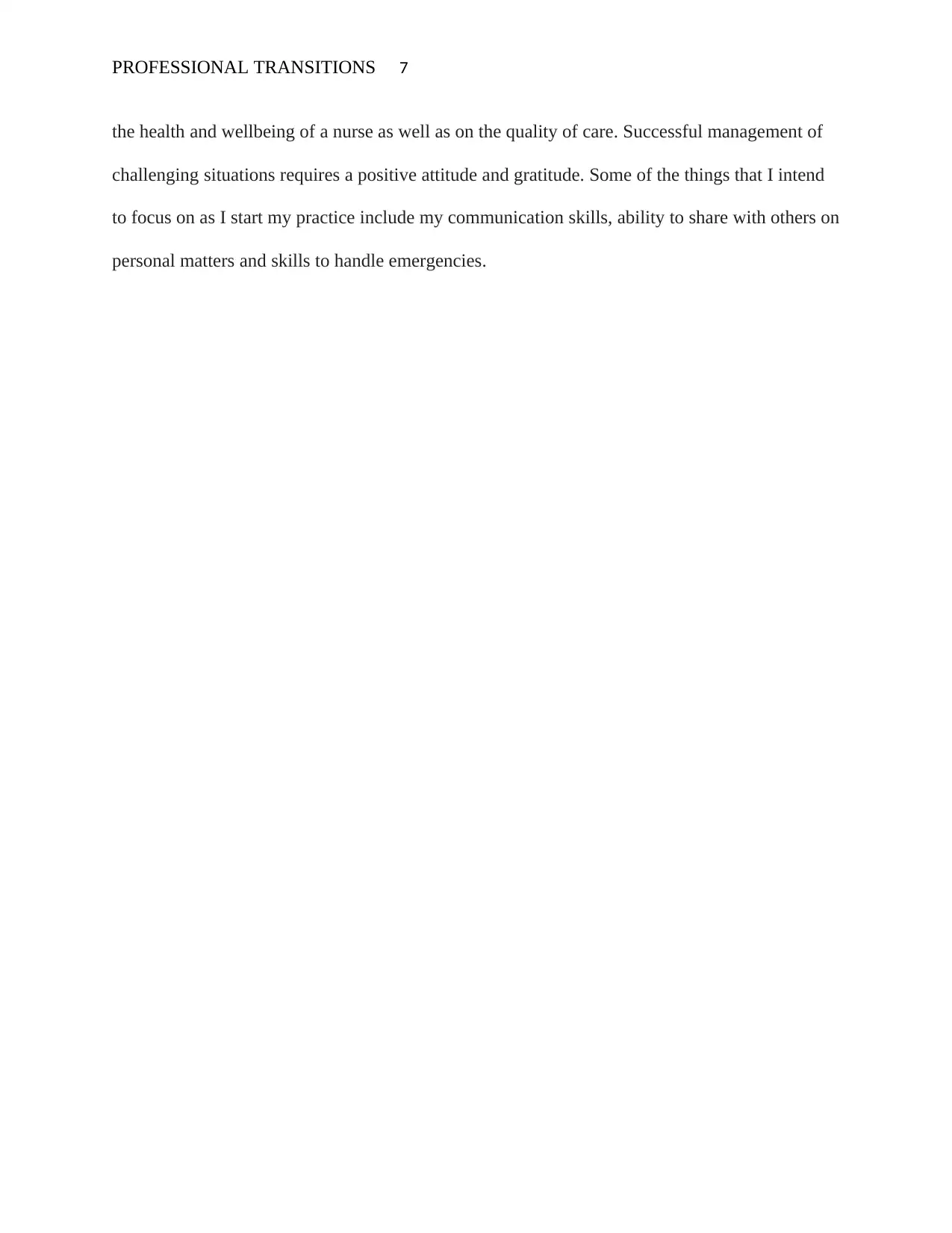
PROFESSIONAL TRANSITIONS 7
the health and wellbeing of a nurse as well as on the quality of care. Successful management of
challenging situations requires a positive attitude and gratitude. Some of the things that I intend
to focus on as I start my practice include my communication skills, ability to share with others on
personal matters and skills to handle emergencies.
the health and wellbeing of a nurse as well as on the quality of care. Successful management of
challenging situations requires a positive attitude and gratitude. Some of the things that I intend
to focus on as I start my practice include my communication skills, ability to share with others on
personal matters and skills to handle emergencies.
Paraphrase This Document
Need a fresh take? Get an instant paraphrase of this document with our AI Paraphraser
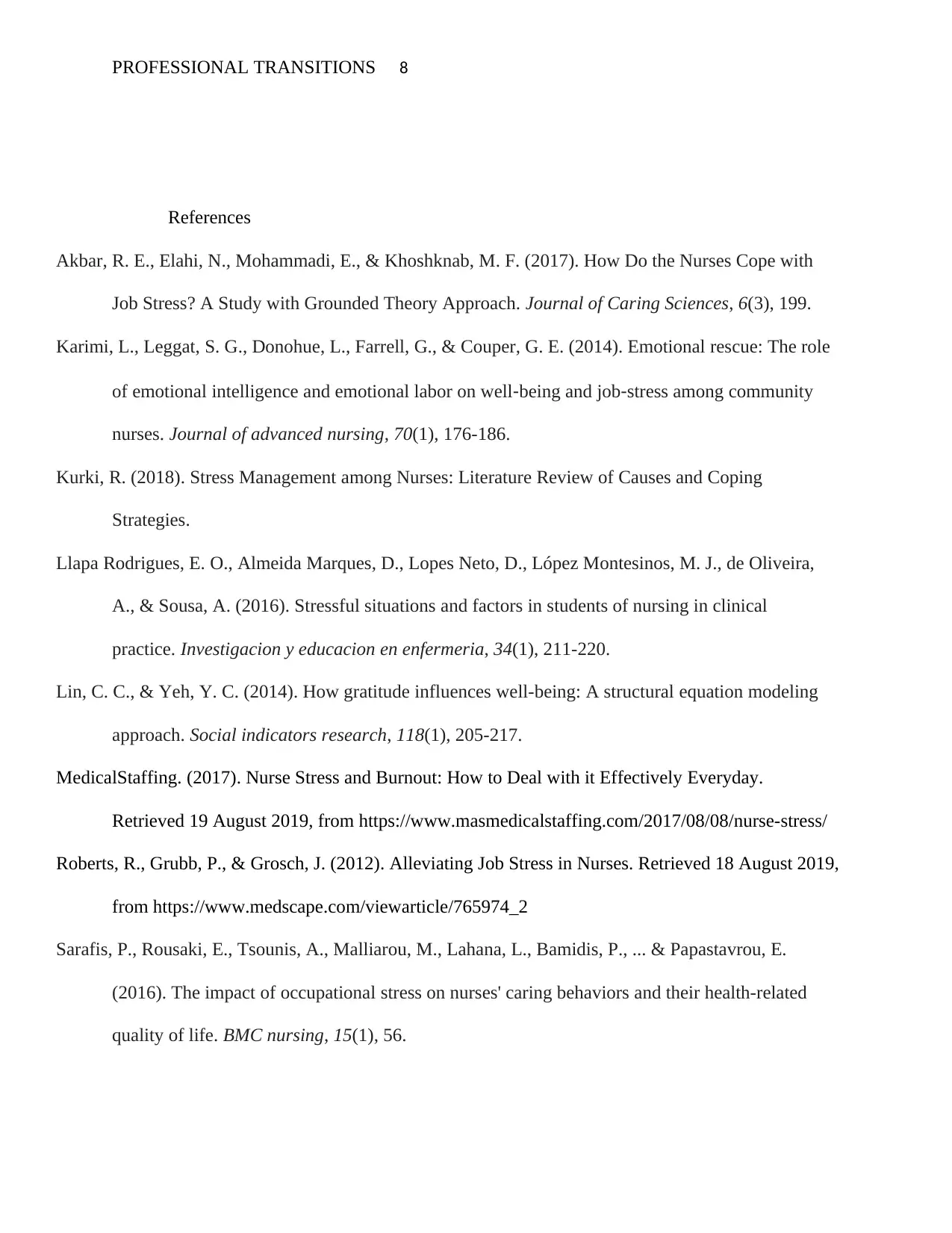
PROFESSIONAL TRANSITIONS 8
References
Akbar, R. E., Elahi, N., Mohammadi, E., & Khoshknab, M. F. (2017). How Do the Nurses Cope with
Job Stress? A Study with Grounded Theory Approach. Journal of Caring Sciences, 6(3), 199.
Karimi, L., Leggat, S. G., Donohue, L., Farrell, G., & Couper, G. E. (2014). Emotional rescue: The role
of emotional intelligence and emotional labor on well‐being and job‐stress among community
nurses. Journal of advanced nursing, 70(1), 176-186.
Kurki, R. (2018). Stress Management among Nurses: Literature Review of Causes and Coping
Strategies.
Llapa Rodrigues, E. O., Almeida Marques, D., Lopes Neto, D., López Montesinos, M. J., de Oliveira,
A., & Sousa, A. (2016). Stressful situations and factors in students of nursing in clinical
practice. Investigacion y educacion en enfermeria, 34(1), 211-220.
Lin, C. C., & Yeh, Y. C. (2014). How gratitude influences well-being: A structural equation modeling
approach. Social indicators research, 118(1), 205-217.
MedicalStaffing. (2017). Nurse Stress and Burnout: How to Deal with it Effectively Everyday.
Retrieved 19 August 2019, from https://www.masmedicalstaffing.com/2017/08/08/nurse-stress/
Roberts, R., Grubb, P., & Grosch, J. (2012). Alleviating Job Stress in Nurses. Retrieved 18 August 2019,
from https://www.medscape.com/viewarticle/765974_2
Sarafis, P., Rousaki, E., Tsounis, A., Malliarou, M., Lahana, L., Bamidis, P., ... & Papastavrou, E.
(2016). The impact of occupational stress on nurses' caring behaviors and their health-related
quality of life. BMC nursing, 15(1), 56.
References
Akbar, R. E., Elahi, N., Mohammadi, E., & Khoshknab, M. F. (2017). How Do the Nurses Cope with
Job Stress? A Study with Grounded Theory Approach. Journal of Caring Sciences, 6(3), 199.
Karimi, L., Leggat, S. G., Donohue, L., Farrell, G., & Couper, G. E. (2014). Emotional rescue: The role
of emotional intelligence and emotional labor on well‐being and job‐stress among community
nurses. Journal of advanced nursing, 70(1), 176-186.
Kurki, R. (2018). Stress Management among Nurses: Literature Review of Causes and Coping
Strategies.
Llapa Rodrigues, E. O., Almeida Marques, D., Lopes Neto, D., López Montesinos, M. J., de Oliveira,
A., & Sousa, A. (2016). Stressful situations and factors in students of nursing in clinical
practice. Investigacion y educacion en enfermeria, 34(1), 211-220.
Lin, C. C., & Yeh, Y. C. (2014). How gratitude influences well-being: A structural equation modeling
approach. Social indicators research, 118(1), 205-217.
MedicalStaffing. (2017). Nurse Stress and Burnout: How to Deal with it Effectively Everyday.
Retrieved 19 August 2019, from https://www.masmedicalstaffing.com/2017/08/08/nurse-stress/
Roberts, R., Grubb, P., & Grosch, J. (2012). Alleviating Job Stress in Nurses. Retrieved 18 August 2019,
from https://www.medscape.com/viewarticle/765974_2
Sarafis, P., Rousaki, E., Tsounis, A., Malliarou, M., Lahana, L., Bamidis, P., ... & Papastavrou, E.
(2016). The impact of occupational stress on nurses' caring behaviors and their health-related
quality of life. BMC nursing, 15(1), 56.
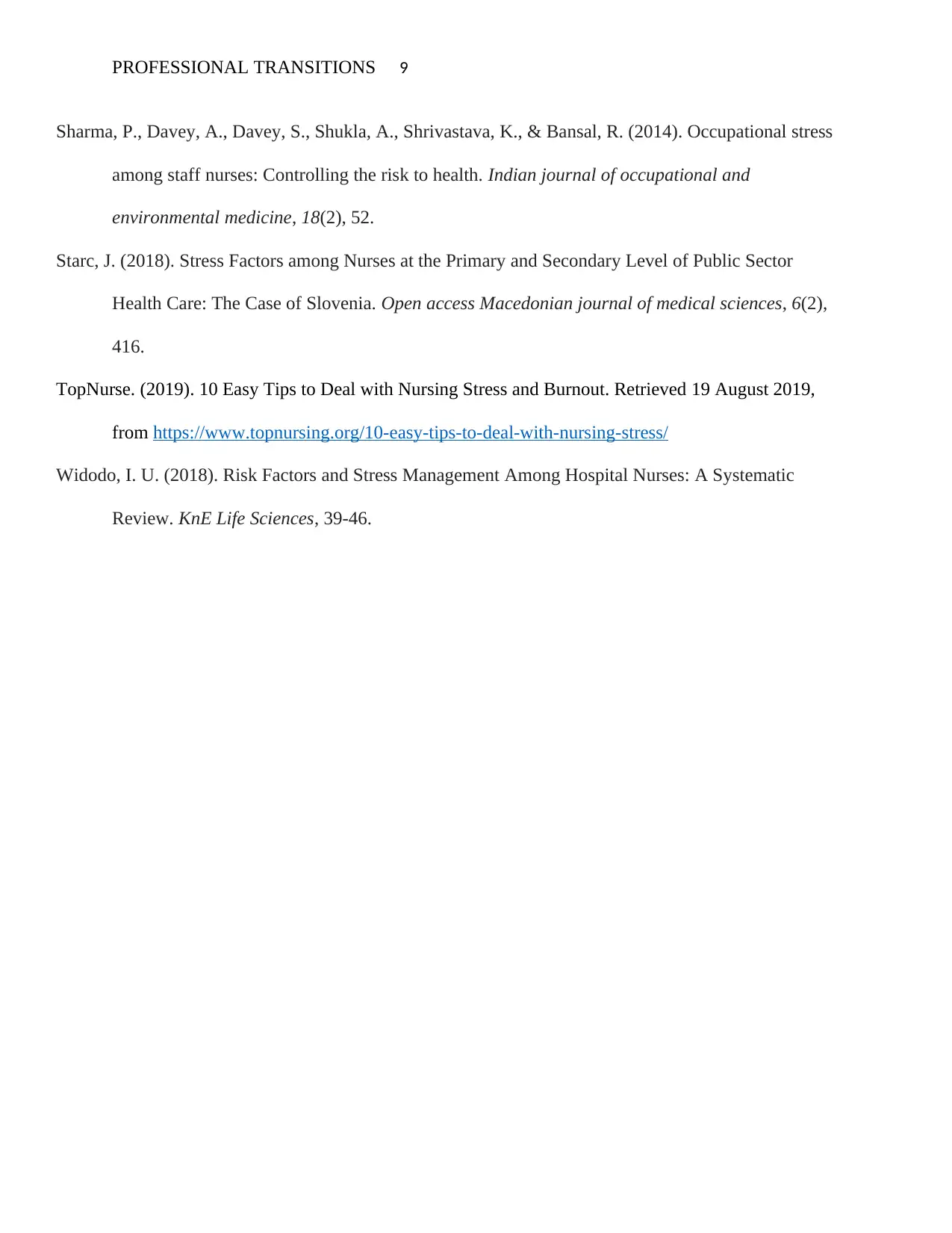
PROFESSIONAL TRANSITIONS 9
Sharma, P., Davey, A., Davey, S., Shukla, A., Shrivastava, K., & Bansal, R. (2014). Occupational stress
among staff nurses: Controlling the risk to health. Indian journal of occupational and
environmental medicine, 18(2), 52.
Starc, J. (2018). Stress Factors among Nurses at the Primary and Secondary Level of Public Sector
Health Care: The Case of Slovenia. Open access Macedonian journal of medical sciences, 6(2),
416.
TopNurse. (2019). 10 Easy Tips to Deal with Nursing Stress and Burnout. Retrieved 19 August 2019,
from https://www.topnursing.org/10-easy-tips-to-deal-with-nursing-stress/
Widodo, I. U. (2018). Risk Factors and Stress Management Among Hospital Nurses: A Systematic
Review. KnE Life Sciences, 39-46.
Sharma, P., Davey, A., Davey, S., Shukla, A., Shrivastava, K., & Bansal, R. (2014). Occupational stress
among staff nurses: Controlling the risk to health. Indian journal of occupational and
environmental medicine, 18(2), 52.
Starc, J. (2018). Stress Factors among Nurses at the Primary and Secondary Level of Public Sector
Health Care: The Case of Slovenia. Open access Macedonian journal of medical sciences, 6(2),
416.
TopNurse. (2019). 10 Easy Tips to Deal with Nursing Stress and Burnout. Retrieved 19 August 2019,
from https://www.topnursing.org/10-easy-tips-to-deal-with-nursing-stress/
Widodo, I. U. (2018). Risk Factors and Stress Management Among Hospital Nurses: A Systematic
Review. KnE Life Sciences, 39-46.
⊘ This is a preview!⊘
Do you want full access?
Subscribe today to unlock all pages.

Trusted by 1+ million students worldwide
1 out of 9
Related Documents
Your All-in-One AI-Powered Toolkit for Academic Success.
+13062052269
info@desklib.com
Available 24*7 on WhatsApp / Email
![[object Object]](/_next/static/media/star-bottom.7253800d.svg)
Unlock your academic potential
Copyright © 2020–2026 A2Z Services. All Rights Reserved. Developed and managed by ZUCOL.





